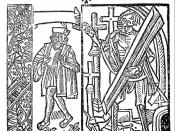The mediaval English drama ÃÂEverymanàis an example of a morality play and a naïve allegory. The plays show the reckoning and judgement of the sinful main character, Everyman. Death is sent to him by God and he faces the task of a journey to save his immortal soul. The play effectively carries out the assumption that people are to be judged at the end of their lives through plot, teaches the lesson that a personÃÂs life must be devoted to God and good deeds in order to save his or her soul, and shows that Eveyman truly deserved to be saved due to his dramatic change.
ÃÂEverymanÃÂ fufills the assumption that people are judged at the end of life through its storyline. When God sends Death to Everyman, he does not decide whether or not Everyman will be accepted into Heaven. He does not mention what his judgement will be, but merely tells Death, ÃÂGo thou to Everyman / And show him, in my name, / A pilgrimage he must on him take,ÃÂ(p.
246 ll. 66-68). While Everyman is still alive no judgement is made. He simply continues on his journey. It is not until he is in his grave that a judgement is made. Just after Everyman a Good Deeds enter the grave, an Angels tells Everyman he is to go into heaven (p. 250 ll. 888-901). With this as the resolution, the story shows EverymanÃÂs judgement at the end of his life, fufilling the assumption as to when judgment will occur.
ÃÂEverymanÃÂ teaches the lesson that Life should be devoted to good works and God. The story displays this theme strongly in EverymanÃÂs journey. The theme is highlighted as the main character is searching for company on...


